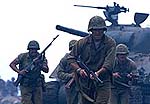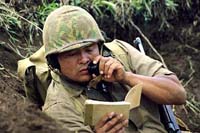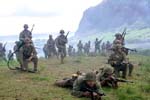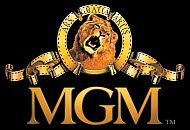Windtalkers
 for pervasive graphic war violence, and for language.
for pervasive graphic war violence, and for language.
Reviewed by: Deanna Marquart
CONTRIBUTOR
| Moral Rating: | Average |
| Moviemaking Quality: |
|
| Primary Audience: | Adults |
| Genre: | Action / Drama |
| Length: | 2 hr. 14 min. |
| Year of Release: | 2002 |
| USA Release: |



| Featuring |
|---|
| Nicolas Cage, Adam Beach, Christian Slater, Noah Emmerich, Emily Mortimer |
| Director |
|
John Woo |
| Producer |
| John Woo, Terence Chang, Tracie Graham, Alison Rosenzweig |
| Distributor |
“In a war, there are secrets that need to be kept—and heroes that need to keep them.”
During the summer of 1991, I went on a college cross cultural trip to the Navajo Nation. From the experience, my eyes were opened to the real culture of the Native Americans and how the “Cowboys and Indians” understanding I had grown up with about them was a cruel propaganda lie. Also during this trip, I heard for the first time about the Navajo Code Talkers, a group of Navajo men assigned by the U.S. military during WWII to send radio communications using words from their own language as code. I thought then that someone ought to make a movie about them. My desire has finally been granted.
“Windtalkers” brings to life a story of one of these Navajo Code Talkers, Ben Yahzee (Beach), through the journey of Marine Sergeant Joe Enders (Cage). The sole survivor of a battle that had been lost because the Japanese had broken the last code, Enders is assigned as the bodyguard of Yahzee. This assignment, however, comes with a secret high price. The code must be protected above the code talker. Still suffering from the responsibility he shouldered in the loss of his last company, he must now deal with the possibility of having to kill the man he is to closely guard should capture become imminent, and only he and a fellow soldier (Slater) with the same charge over Yahzee’s friend (Willie) know about it.
In our “post-9/11 world,” war movies have taken on a whole new meaning for our society. We’re looking for heroes, we’re looking for honor and dignity and valor, we’re looking for sacrifice, we’re looking for victory to rise above through ashes, and we’re looking to feel the lives of those involved. This movie satisfies these longings.
On the negative side, the movie contains a lot of violence and a lot of foul language and use of the Lord’s name in vain (Kids-in-Mind reports “15 F-words, 29 scatological terms, 15 anatomical terms… 9 religious profanities, 7 religious exclamations”). But considering this is a war movie spotlighting Marines that is rated “R”, these should come as no surprise. Some may find the extent to which the battle scenes are played out unnecessary while others may see that as the reality of a war situation. The only complaint that came out of my ex-military family members was how the hand grenades always exploded in fire (in reality, they only expel smoke and shrapnel).
In its favor, the movie also contains many positive elements. On the moral side, there is no sex or nudity (although the card deck used in one scene does come too close). On the valor side, the movie portrays many examples of heroism, sacrifice, duty, loyalty, compassion and forgiveness. Enders, as well as some of the others, come out by the end as shining stars, people who make you feel proud (proud in the good sense of the word). Additionally, the movie exposes the ignorant, racist attitude Americans have/had developed towards the “Injuns” for what it is, and throughout the movie worked towards overcoming it. (“I’m not an ‘Injun,’ I’m a Navajo,” Yahzee states in rebuke at one point in the film.) The use of traditional native rituals portrayed in the film may be bothersome to some; however, these rituals come across as an expression of culture and of faith rather than as a worship of false deities. Moreover, Enders and Yahzee share together their experiences of having grown up in the Catholic Church.
 Overall, I would recommend this film. The exception would be to those who are sensitive to extensive violence and language. This is a solidly “R” rated film, after all. Aside from that, the cinematography is remarkable and the acting is very well done. Dramatically, the heart-strings are pulled. One can really “feel” the characters. Good nature and upstanding character are not only displayed but also praised and honored. These qualities help to make “Windtalkers” worthwhile for many.
Overall, I would recommend this film. The exception would be to those who are sensitive to extensive violence and language. This is a solidly “R” rated film, after all. Aside from that, the cinematography is remarkable and the acting is very well done. Dramatically, the heart-strings are pulled. One can really “feel” the characters. Good nature and upstanding character are not only displayed but also praised and honored. These qualities help to make “Windtalkers” worthwhile for many.


Another review, not quite as positive as the one above
 An action-packed war movie featuring the unsung Navajo heroes, the “codetalkers,” sounded like a great premise. But unfortunately, this movie fell short of its potential. The story focuses on two particular Navajo codetalkers. The unit to which these men are assigned is given the task of spearheading the American assault of the Japanese island of Saipan. Aside from a very brief training sequence and a couple radio calls for combat support, very little is explained or highlighted about the actual work of the codetalkers. Instead, the film seems to emphasize the dilemma faced by the men assigned to protect the unique Navajo code. Their orders were to protect the code from the enemy at all costs—including, if necessary, killing the Navajo soldiers rather than letting them fall into enemy hands.
An action-packed war movie featuring the unsung Navajo heroes, the “codetalkers,” sounded like a great premise. But unfortunately, this movie fell short of its potential. The story focuses on two particular Navajo codetalkers. The unit to which these men are assigned is given the task of spearheading the American assault of the Japanese island of Saipan. Aside from a very brief training sequence and a couple radio calls for combat support, very little is explained or highlighted about the actual work of the codetalkers. Instead, the film seems to emphasize the dilemma faced by the men assigned to protect the unique Navajo code. Their orders were to protect the code from the enemy at all costs—including, if necessary, killing the Navajo soldiers rather than letting them fall into enemy hands.
There are a few brief moments of humor and a couple attempts at developing an emotional subplot, but most of the characters in the film are very one-dimensional and lack any compelling interest. The vast majority of the film is taken up with almost non-stop ground combat sequences. Machine guns, sniper rifles, grenades, mortar rounds, naval guns, combat knives, and even samurai swords are used to wound, maim, dismember, and kill. The violence is often quite graphic and leaves little to the imagination. Obviously, one expects this type of action in a war movie, but the balance of plot and action seems to be seriously out of whack in this film.
The film also contains numerous occasions of profanity and some racist comments. There is a very brief discussion of religion (two of the characters have a short talk about their Roman Catholic background), but the subject is not given any real attention. Other than that, the worldview of the characters is mostly one without hope and full of despair.
The film is not without any merits, however. Director John Woo is well-known for his special brand of action, and some of the sequences are truly exciting and well done. At times the film succeeds in driving home the horrors of war and the intense emotional struggles that soldiers face under combat situations. And, although the plot was weak, there were points at which the close friendships that develop among soldiers were effectively highlighted. The quality of the sound effects was also stunning and worked quite well to pull the viewer into the moment.
In short, for those who enjoy war movies and who can endure the violence, weak plot, shallow characters, and the repetition, there may be something here to entertain or educate.
[Very Offensive / 3½]
Other comments…
[Average / 4]
[Average / 3]
Average / 3
[Average / 2]
[Very Offensive / 5]
[Very Offensive / 2]
[Very Offensive / 2½]
[Extremely Offensive / 1]
And last, but certainly least, were the dreadfully repetitive battle sequences. Following the final battle sequence, Chick, played by Noah Emmerich, approaches Enders and Yahzee proclaiming I think that’s the last of em’ after killing upwards of two million Japanese soldiers in downwards of two hours. I was expecting him to follow up with something like I guess we’ll have to send back to Japan for some more. This movie trivializes death by killing so many people in a method completely devoid of any emotion. By the end of the movie I was just hoping Enders would die, or morph into Thomas Builds-the-Fire from Smoke Signals (The movie Adam Beach should be remembered for). At the end of the movie I didn’t know whether I wanted to laugh at Cage’s laughable performance, or cry because Windtalkers wasted an opportunity to tell the rare story worth telling.
[Average / 1]
[Average / 5]
[Very Offensive / 3½]

My Ratings: [Very Offensive / 3]